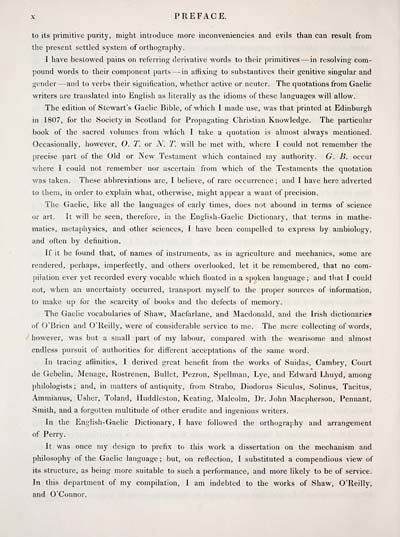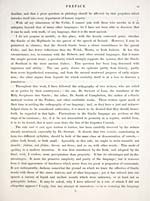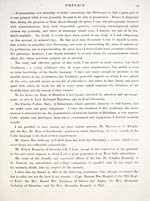Download files
Complete book:
Individual page:
Thumbnail gallery: Grid view | List view

X PREFACE.
to its primitive purity, might introduce more inconveniencies and evils than can result from
the present settled system of orthography.
I have bestOM^ed pains on referring derivative words to their primitives — in resolving com-
pound words to their component parts — -in affixing to substantives their genitive singular and
gender — ^and to verbs their signification, whether active or neuter. The quotations from Gaelic
writers are translated into English as literally as the idioms of these languages will allow.
The edition of Stewart's Gaelic Bible, of which I made use, was that printed at Edinburgh
in 1807, for the Society in Scotland for Propagating Christian Knowledge. The particular
book of the sacred volumes from which I take a cjuotation is almost always mentioned.
Occasionally, however, O. T. or iV. T. will be met with, where I could not remember the
precise part of the Old or New Testament which contained my authority. G. B. occur
v/here I could not remember nor ascertain from which of the Testaments the quotation
v/as taken. These abbreviations are, I believe, of rare occurrence; and I have here adverted
to them, in order to explain what, otherwise, might appear a want of precision.
The Gaelic, like all the languages of early times, does not abound in terms of science
or art. It will be seen, therefore, in the English-Gaelic Dictionary, that terms in mathe-
matics, metaphysics, and other sciences, I have been compelled to express by ambiology,
and often by definition.
If it be found that, of names of instruments, as in agriculture and mechanics, some are
rendered, perhaps, imperfectly, and others overlooked, let it be remembered, that no com-
pilation ever yet recorded every vocable which floated in a spoken language ; and that I could
not, when an uncertainty occurred, transport myself to the proper sources of information,
to make up for the scarcity of books and the defects of memory.
The Gaelic vocabularies of Shaw, Macfarlane, and Macdonald, and the Irish dictionaries
of O'Brien and O'Reilly, were of considerable service to me. The mere collecting of words,
however, was but a small part of my labour, compared with the wearisome and almost
endless pursuit of authorities for different acceptations of the same word.
In tracing afiinities, I derived great benefit from the works of Suidas, Cambry, Court
de Gebelin, Menage, Rostrenen, Bullet, Pezron, S])ellman, Lye, and Edward Lhuyd, among
philologists ; and, in matters of antiquity, from Strabo, Diodorus Siculus, Solinus, Tacitus,
Ammianus, Usher, Toland, Huddleston, Keating, Malcolm, Dr. John Macpherson, Pennant,
Sniith, and a forgotten multitude of other erudite and ingenious writers.
In the English-Gaelic Dictionary, I have followed the orthography and arrangement
of Perry.
It was once my design to prefix to this work a dissertation on the mechanism and
philosophy of the Gaelic language ; but, on reflection, I substituted a compendious view of
its structure, as being more suitable to such a performance, and more likely to be of service.
In this department of my compilation, I am indebted to the works of Shaw, O'Reilly,
and O'Connor.
to its primitive purity, might introduce more inconveniencies and evils than can result from
the present settled system of orthography.
I have bestOM^ed pains on referring derivative words to their primitives — in resolving com-
pound words to their component parts — -in affixing to substantives their genitive singular and
gender — ^and to verbs their signification, whether active or neuter. The quotations from Gaelic
writers are translated into English as literally as the idioms of these languages will allow.
The edition of Stewart's Gaelic Bible, of which I made use, was that printed at Edinburgh
in 1807, for the Society in Scotland for Propagating Christian Knowledge. The particular
book of the sacred volumes from which I take a cjuotation is almost always mentioned.
Occasionally, however, O. T. or iV. T. will be met with, where I could not remember the
precise part of the Old or New Testament which contained my authority. G. B. occur
v/here I could not remember nor ascertain from which of the Testaments the quotation
v/as taken. These abbreviations are, I believe, of rare occurrence; and I have here adverted
to them, in order to explain what, otherwise, might appear a want of precision.
The Gaelic, like all the languages of early times, does not abound in terms of science
or art. It will be seen, therefore, in the English-Gaelic Dictionary, that terms in mathe-
matics, metaphysics, and other sciences, I have been compelled to express by ambiology,
and often by definition.
If it be found that, of names of instruments, as in agriculture and mechanics, some are
rendered, perhaps, imperfectly, and others overlooked, let it be remembered, that no com-
pilation ever yet recorded every vocable which floated in a spoken language ; and that I could
not, when an uncertainty occurred, transport myself to the proper sources of information,
to make up for the scarcity of books and the defects of memory.
The Gaelic vocabularies of Shaw, Macfarlane, and Macdonald, and the Irish dictionaries
of O'Brien and O'Reilly, were of considerable service to me. The mere collecting of words,
however, was but a small part of my labour, compared with the wearisome and almost
endless pursuit of authorities for different acceptations of the same word.
In tracing afiinities, I derived great benefit from the works of Suidas, Cambry, Court
de Gebelin, Menage, Rostrenen, Bullet, Pezron, S])ellman, Lye, and Edward Lhuyd, among
philologists ; and, in matters of antiquity, from Strabo, Diodorus Siculus, Solinus, Tacitus,
Ammianus, Usher, Toland, Huddleston, Keating, Malcolm, Dr. John Macpherson, Pennant,
Sniith, and a forgotten multitude of other erudite and ingenious writers.
In the English-Gaelic Dictionary, I have followed the orthography and arrangement
of Perry.
It was once my design to prefix to this work a dissertation on the mechanism and
philosophy of the Gaelic language ; but, on reflection, I substituted a compendious view of
its structure, as being more suitable to such a performance, and more likely to be of service.
In this department of my compilation, I am indebted to the works of Shaw, O'Reilly,
and O'Connor.
Set display mode to: Large image | Transcription
Images and transcriptions on this page, including medium image downloads, may be used under the Creative Commons Attribution 4.0 International Licence unless otherwise stated. ![]()
| Early Gaelic Book Collections > Blair Collection > Gaelic dictionary, in two parts > (16) |
|---|
| Permanent URL | https://digital.nls.uk/79284341 |
|---|
| Description | A selection of books from a collection of more than 500 titles, mostly on religious and literary topics. Also includes some material dealing with other Celtic languages and societies. Collection created towards the end of the 19th century by Lady Evelyn Stewart Murray. |
|---|
| Description | Selected items from five 'Special and Named Printed Collections'. Includes books in Gaelic and other Celtic languages, works about the Gaels, their languages, literature, culture and history. |
|---|

